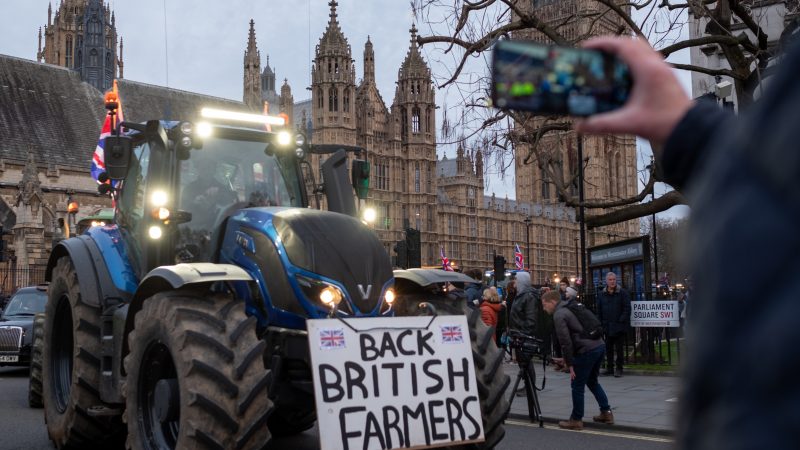
No political party has ever formed a government without at least some rural voters. At the most recent election, Labour made enormous strides forward with rural Britain.
Fabian Society analysis found the party went from representing just two of the most rural constituencies to representing 40. Even in seats that were only partially rural, those rural voters often made the difference between defeat and victory.
Since the Budget, these rural votes have enjoyed an all-too-rare time in the spotlight. Numerous commentators have argued that the governments’ reforms to inheritance tax have put Labour’s rural seats at risk. The Telegraph has argued ‘the showdown with farmers risks defining Starmer’s government’, while the I suggests that ‘Labour could lose 59 seats over farmer inheritance taxes.’
However, the likely political impact is just as inflated as their supposed economic impact. In fact, for most voters in rural areas, inheritance tax changes are unlikely to make a difference to how they vote in a few years’ time.
They are not farmers (many of whom will not be hit by these changes despite the scare stories), not employed in agriculture – and will not be affected by this change. While they are more likely than average to care about the future of British farming, rural voters are not massively different to those in towns or big cities.
So, to keep vital rural seats at the next election, Labour must focus relentlessly on showing it understands the real concerns of those who live in rural communities, not the vested interests of those represented on the front page of The Telegraph. Because while inheritance tax changes alone are unlikely to shift rural voters away from Labour, ignoring the countryside will. That raises the question: what do rural voters really care about?
What do rural voters care about?
Fabian Society research has found that voters in rural communities care more about the challenges facing their immediate family such as getting a GP appointment, the cost of essentials, and ensuring their kids get ahead.
Just as rural voters worried about the cost-of-living crisis, NHS waiting lists and immigration at the last election, they will probably make their decision on similar issues at the next election. And ultimately, Ronald Reagan’s famous formulation– ‘are you better off now than you were then’ – applies as much to voters in rural communities, as it does to those in towns and cities.
Our research also found significant rural disaffection pre-election – with many people believing their communities were neglected. When asked ‘is your local area prioritised by politicians in Westminster when decisions are made about the future of the country’, 70% of rural respondents said that it wasn’t.
READ MORE: ‘Labour might just be in round one of its clash with farmers’
This was higher than across Britain as a whole, where 62% felt their area was not prioritised. Labour has to address this with a story, rooted in the values shared in towns cities and villages across the country: home, security and stability.
And they need to show they are different to the Conservatives – who might have taken care of very wealthy landowners, but often sidelined the real issues and the interests of the rural majority.
This story needs to be accompanied by delivering on the things that matter to rural voters.
Winning in the countryside
The Fabian Society identified several policy areas where rural communities felt left behind. Opportunities for young people, housing affordability, high streets, and the availability and affordability of public transport – these are all key issues on which rural voters think they are getting a poor deal on compared to other areas.
Delivery will help address rural disaffection and keep rural votes, albeit not on its own.
Public transport is especially overlooked, and vital for rural communities, many of whom are unable to access jobs because of transport, or who have to pay the expense of running a car. That’s why the government’s £1bn for bus services, announced over the weekend, is far more likely to impact rural voters’ attitudes towards the government than inheritance tax changes.
In 2029, just as ahead of the 2024 election, Labour’s route to victory runs through the countryside. But ultimately, the inheritance tax protests should not distract the government from the real task of delivery and narrative.
From strengthening rural bus services to fixing our NHS and cutting the cost of living, the government can have a unifying story of the difference it has made in just five years. If it can get the policy and the story right, all these column inches in The Telegraph will come to nothing on election night.
SIGN UP: Get the best daily roundup and analysis of Labour news and comment in our newsletter
For more from LabourList, follow us on Threads, Bluesky, X, Facebook, Instagram or WhatsApp.
- SHARE: If you have anything to share that we should be looking into or publishing about this story – or any other topic involving Labour– contact us (strictly anonymously if you wish) at [email protected].
- SUBSCRIBE: Sign up to LabourList’s morning email here for the best briefing on everything Labour, every weekday morning.
- DONATE: If you value our work, please donate to become one of our supporters here and help sustain and expand our coverage.
- PARTNER: If you or your organisation might be interested in partnering with us on sponsored events or content, email [email protected].




More from LabourList
Tom Belger column: ‘Why is Labour making migrant exploitation easier?’
Ashley Dalton resigns as health minister for cancer treatment
Paul Nowak column: ‘Labour must focus on the basics’